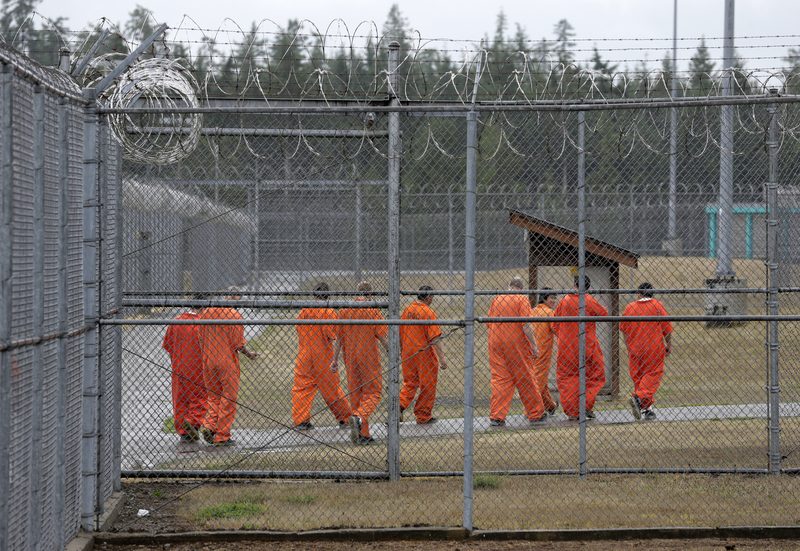BOB GARFIELD: On last week’s show, we covered the ongoing national prisoners strike, and during my conversation with editor of Prison Legal News, Paul Wright, something came up that, while it didn't make the final cut of our interview, really kind of jumped out at us.
PAUL WRIGHT: There’s this big trend nationally. In the Texas prison system, they've enacted rules that basically make it a disciplinary offense if a prisoner's family maintains a social media presence on their behalf.
BOB GARFIELD: Wait. Wait, wait, wait, wait, what? We looked into this, and it’s true. In April, the Texas Department of Criminal Justice quietly issued a new rule prohibiting inmates from social media activity, even if the accounts are maintained by a family member or other third party. This brings Texas into the company of South Carolina, New Mexico and Maine, which have similar rules on the books curbing digital activity for prisoners. Meanwhile, Alabama has a law that makes it illegal for inmates to directly or indirectly participate in chat rooms, emails, forums or, yes, social media.
Dave Maass is an investigative researcher at the Electronic Frontier Foundation, and he's been on this.
DAVE MAASS: You know, the evidence that prisons use to go after inmates is usually pretty thin. And, to understand the judicial process, this doesn't go to a court. This goes to a panel of essentially prison guards who review whatever basic evidence there might be - that might be records they got from Facebook – and they’ll draw conclusions from it, without necessarily any expertise in how IP addresses work, on how Facebook log-ins work. But they’ll draw conclusions anyways. And if they can go through communication logs from the inmate and see that the inmate had said something to the person on the outside that could be interpreted as collaborating on social media, then they might use that to go after an inmate. They will say things like, it's a violation of Facebook's terms of service for a third party to access an account on somebody else's behalf. And so, then they’ll use that as an excuse to get Facebook to remove inmates’ accounts.
It’s not uncommon for prisons to go after inmates who've been engaged in political activity or who have, you know, talked back to a prison guard by finding whatever infraction they can twist to the circumstances in order to punish the inmate.
BOB GARFIELD: South Carolina has been particularly, let’s just say, vigilant for social media activity. Can you give me a for instance of the kind of punishments they've meted out?
DAVE MAASS: Sure. So it used to be that South Carolina would give you a Level 1 offense for every day that you accessed Facebook. A Level 1 offense, that would include escapes, rapes, assaulting people, taking someone hostage, and then at the bottom there's social media access. And we were seeing people getting in excess of 10 years in solitary. They did reduce that and put some limits on it but, you know, as of this last week, you know, people are losing privileges for as much as a year. They’re being put into disciplinary detention, which is solitary confinement, for 30 days, 60 days, losing telephone privileges. And what’s kind of ironic about it is that people are trying to access social media so they can have more communication with the outside, and the response is to further limit people's ability to communicate, hence, creating more of a black market for contraband cell phones and other ways to circumvent communication controls.
BOB GARFIELD: If only there were free speech advocacy organizations with staffs of lawyers who could go out and file lawsuits against authorities in cases like this to preserve the First Amendment.
DAVE MAASS: Well, so far, groups like EFF and the ACLU have been digging into this. It’s not quite at the stage where lawsuits have been filed. More, it's been filing Freedom of Information Act requests, fighting to get records to actually see what the situation is. And then in, say, cases like Texas, we have started communicating with Texas to actually get some clarity on what their policies are.
Now, I'm not a lawyer myself. I'm a sort of muckraker for EFF. I dig into these things and, and use activism as a way to get policies changed, and we have had a lot of success in that regard. We were very, very successful in getting Facebook to move substantially in changing its process for taking down inmate social media pages. But, you know, the courts work and the way that there have been rulings on how you can restrict inmates from speaking, it makes it very difficult to either bring a case and to win that case.
I want to point out that when prisons censor inmates’ speech it's not just censoring the inmate. It’s censoring the ability for everyone in the outside to understand the criminal justice system from the perspective of the people who are most affected by it. It prevents us from understanding, you know, rats in cells, toilets overflowing, beatings that are going on in prisons, the overuse of pepper spray and solitary confinement. And these are things that are important to, to the national dialogue about over-incarceration. And so, you know, that is one of the main values of inmates, you know, whether legally or illegally, getting information out of the prisons, through contraband cell phones and through social media.
BOB GARFIELD: Dave, thank you.
DAVE MAASS: Thank you very much for having me and covering this issue.
BOB GARFIELD: Dave Maass is an investigative researcher at the Electronic Frontier Foundation.
[MUSIC UP & UNDER]
BROOKE GLADSTONE: Coming up, poverty is a hardy media perennial. But does it matter?

